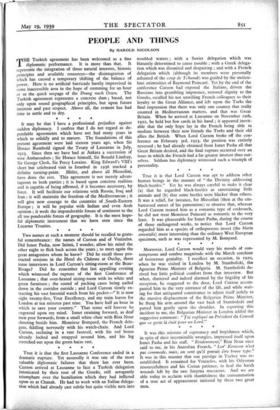True it is that the first Lausanne Conference ended in
a dramatic rupture. Yet assuredly it was one of the most valuable diplomatic failures that there has ever been. Curzon arrived at Lausanne to face a Turkish delegation intoxicated by their rout of the Greeks, still arrogantly triumphant over the humiliation which they had inflicted upon us at Chan*. He had to work with an Italian delega- tion which had already cast subtle but quite visible nets into troubled waters ; with a Soviet delegation which was blatantly determined to cause trouble ; with a Greek delega- tion which was disunited and despairing ; and with a French delegation which (although its members were personally ashamed of the coup de Tchanak) was guided by the meticu- lous animosities of Raymond Poincare. Yet by the end of the conference Curzon had exposed the Italians, driven the Russians into grumbling impotence, restored dignity to the Greeks, recalled his not unwilling French colleagues to their loyalty to the Great Alliance, and left upon the Turks the final impression that there was only one country that really counted in Mediterranean matters, and that was Great Britain. When he arrived at Lausanne on November t9th, 1922, he held but few cards in his hand ; it appeared inevit- able that the only hope lay in the French being able to mediate between their new friends the Turks and their old allies the British. When Lord Curzon broke off the con- ference on February 3rd, 1923, the position was entirely reversed ; he had already obtained from Ismet Pasha all that Great Britain desired, and the final rupture occurred over an issue in which the French had a far greater interest than our- selves. Seldom has diplomacy witnessed such a triumph of personality.


















































 Previous page
Previous page